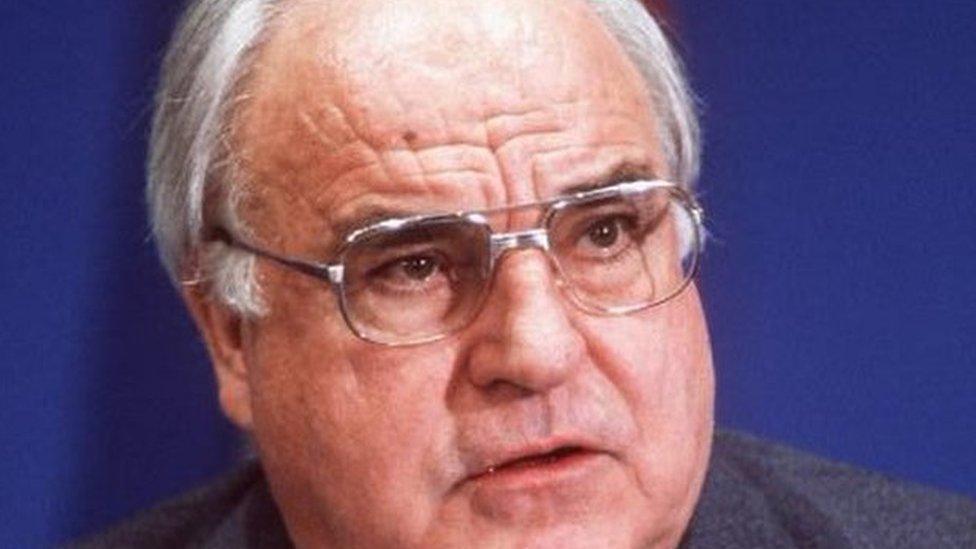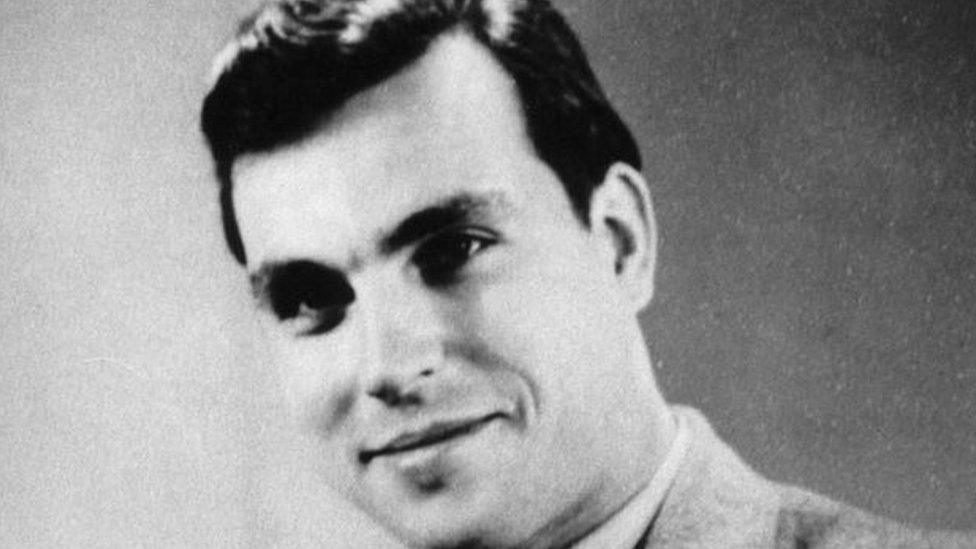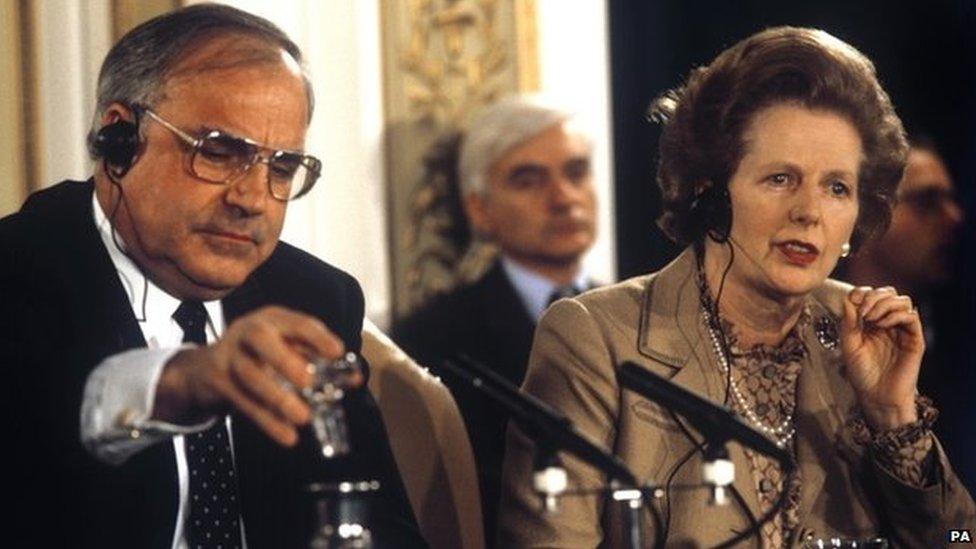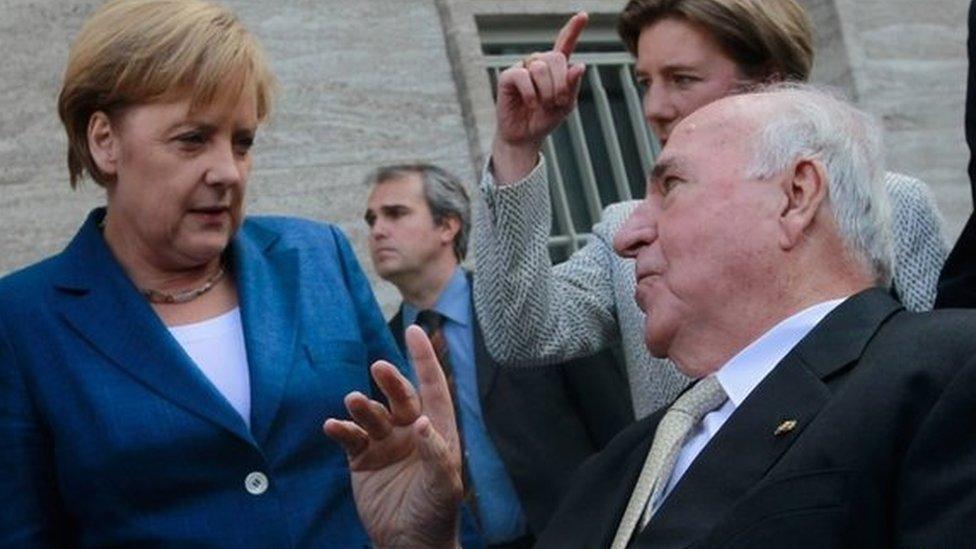Obituary: Helmut Kohl
- Published

Helmut Kohl earned his place in history by securing the successful reunification of Germany after the collapse of communism.
His 16 years in office made him the longest-serving German chancellor since Bismarck and he was once described as the greatest European leader in the second half of the 20th Century.
He was a passionate supporter of greater European integration and was one of the main architects of the Maastricht Treaty.
Yet the end of his career was marred by economic problems in the old East Germany and a financial scandal within his own CDU party.
Helmut Josef Michael Kohl was born on 3 April 1930 into a conservative, Catholic family,
His political outlook was shaped by his experiences in his hometown of Ludwigshafen in the Rhineland during World War Two.
Because of its huge chemical works, the town was heavily bombed and, at the age of 12, the young Helmut found himself helping to recover the charred bodies of his neighbours from the rubble. What he once described as "the blessing of a late birth" freed him from any taints of Nazism.

He became the youngest minister-president in 1969
After studying politics and law at Heidelberg University, Kohl entered politics in the German federal system where, in the Rhineland Palatinate, he rose to become the youngest Land [federal state] minister-president at the age of 39.
He built up a large network of political allies and forced through important changes, among them the law that outlawed denominational schools unless 80% of the parents approved.
Three years later, Kohl became national chairman of the Christian Democratic Union (CDU), the dominant post-war West German political party.
He was the CDU's candidate for chancellor in the 1976 election, but was defeated by the Social Democrat/Free Democrat coalition of Helmut Schmidt.
Golden age
Four years later, Kohl looked on as another CDU candidate, and great rival, the Bavarian Prime Minister Franz Josef Strauss, also went down to defeat by Schmidt.
A bear of a man, Kohl was often ridiculed for his love of food - one nickname being "Birne" or pear - and for his often clumsy provincial manner. Beyond this, Kohl's critics relentlessly mocked him for what they said was his lacklustre oratory and apparent lack of vision.
But many underestimated his ability to wield power, which he managed through a complex, but highly effective, network of patronage and political cronies.

He clashed with Margaret Thatcher over greater European integration
In 1982, after the Free Democrats had left the ruling coalition, he took over as chancellor from Helmut Schmidt, and would go on to win the next four general elections, staying in power for 16 years.
The 1980s witnessed a golden age of German economic and political power. Together with his closest ally, France's President Mitterrand, Kohl shaped the federal ideal of the European Union and laid the groundwork for the creation of the single currency.
In 1987 there was a groundbreaking visit to West Germany by the East German leader, Erich Honecker. It was part of Kohl's policy of detente with the East, something his party had firmly rejected just 20 years before.
Two years later, the Berlin Wall came down and Kohl began the negotiations that would lead to reunification.
Economic dislocation
Having realised that Soviet leader Mikhail Gorbachev's attempts to reform communism would fail, Kohl persuaded him to withdraw from East Germany, while allowing a reunited Germany to remain a member of Nato.
The 350,000 Soviet troops based in the East were sent home, the costs borne by the West German government. On 3 October 1990, East Germany ceased to exist with its five historical states becoming part of the new federal republic.
Kohl's drive for reunification was not welcomed by everyone, with Israel's Prime Minister Yitzhak Shamir publicly opposing it. While broadly welcomed by the West, there were concerns, notably in Britain and Poland, that a strong unified Germany would come to dominate the continent.
But Kohl was able to convince Gorbachev and US President George HW Bush that a united Germany would not destabilise or threaten Europe in the way Hitler's Germany had done.
"George Bush was for me the most important ally on the road to German unity," he said.
Kohl also made the political decision to grant East Germans immediate economic parity, even though his central bankers told him of the massive economic dislocation this would incur. They predicted correctly that Germany's economy would be badly affected for a decade.
Even so, Helmut Kohl had pulled off a remarkable political coup that might not have occurred had he dithered. But the huge economic repercussions of reunification robbed him of some of the popularity he might have expected, particularly in the former East where, during one visit, he was pelted with eggs.
Under his rule, the East suffered an economic collapse, with high rates of poverty and unemployment the norm. And the costs of reunification led to an economic downturn throughout Germany.
Strained relationship
He was slow to respond when neo-Nazis burned down the homes of immigrant Turkish families and hostels for refugees from Africa. He sometimes pushed aside the concerns of smaller nations to the east, like the Czechs and the Poles.
And he had a strained relationship with the UK and other countries that did not share his vision of a federal Europe.
Chief among Kohl's perceived antagonists was Margaret Thatcher. In a revealing volume of autobiography, published in 2005, he alleged that her anger boiled over in December 1989 after she was obliged to sign a communique supporting German reunification.

He joined Angela Merkel at the 20th anniversary of German reunification in 2010
"I will never forget Margaret Thatcher's angry observation: 'We have beaten the Germans twice. Now they're back.'"
After he lost power in elections in 1998, it was revealed that Kohl had accepted, for his party, millions of dollars of secret political donations.
Despite refusing to name the donors, and despite his destroying much potentially incriminating evidence before he left the chancellery, he was spared possible corruption charges out of respect for his years of leadership.
But his reputation was badly damaged. To his opponents, Helmut Kohl could be insensitive and a bully. The suicide of his wife, Hannelore, in July 2001, seemed to exemplify his political and personal eclipse.
In 2010, an ailing Helmut Kohl joined Chancellor Angela Merkel in celebrations to mark the 20th anniversary of German reunification, something that will be seen as his greatest achievement.
"I have been underestimated for decades," he once said. "I have done very well that way."